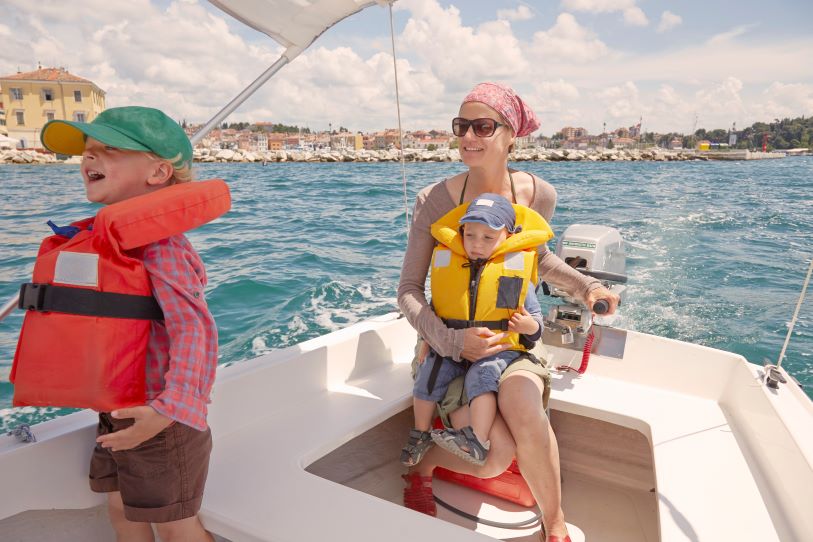
Florida’s extensive coastline, numerous lakes, and great weather make it a premier destination for water sports enthusiasts. However, the fun of boating and jet skiing comes with inherent risks. Understanding the necessary safety precautions and knowing the legal steps to ensure boating safety can help ensure your summer adventures remain enjoyable and safe.
Boaters Paradise, but…
Florida has more registered recreational vessels, – 987,769 – than any other state, including California (data as of 2021). In addition, as of 2022, the state is home to 168,916 registered personal watercrafts (i.e. jet skis). As a result, Florida sees a significant number of watercraft accidents. In 2022, the most accidents occurred in these Florida counties:
-
Monroe (Florida Keys)
-
Miami-Dade
-
Palm Beach
-
Pinellas
-
Lee
According to the Florida Fish and Wildlife Conservation Commission (FWC), in 2022, there were 735 reported boating accidents, resulting in 65 fatalities and 457 injuries. Clearly, this is a message to boaters that they need to take the necessary precautions in order to avoid accidents, injury, and potentially, death.
Precautions for Safe Boating and Jet Skiing
1. Education & Training
Florida law requires anyone born on or after January 1, 1988, operating a vessel powered by engines of 10 horsepower or more to pass an approved boater education course and to carry a Boater Identification Card issued by the FWC. In Florida, ensuring all operators are educated and understand Florida boating laws is crucial.
2. Safety Gear
All vessels should be equipped with the required safety gear, including life jackets for all passengers, fire extinguishers, visual distress signals, and a whistle or horn. Florida law mandates that all children under the age of six (6) wear a U.S. Coast Guard-approved life jacket at all times while on vessels under 26 feet in length.
3. Avoid Alcohol
Operating a boat or jet ski under the influence of alcohol or drugs is not only illegal, but also increases the risk of accidents on the water. Florida’s BUI (Boating Under the Influence) laws are strictly enforced, and penalties can include fines, imprisonment, and loss of boating privileges.
4. Weather and Water Conditions
Always check the weather forecast before heading out and be aware of local water conditions. Florida’s weather can change rapidly, and being caught in a sudden storm on the water can be dangerous.
5. Communication Plan
Always inform someone onshore of your boating plan (trip plan), including your destination and expected return time. Carry a charged cell phone or a marine radio to communicate in case of an emergency.
Steps to take After a Boating or Jet Ski Accident
Per Florida boating laws, a vessel operator is required to promptly notify the authorities of a boating accident involving any of the following:
-
Injury requiring medical treatment beyond basic first aid.
-
Death.
-
Disappearance of someone on board under circumstances that suggest death or injury.
-
Damage to any vessel or personal property that totals $2,000.00 or more.
It is illegal for a vessel operator involved in an accident to leave the scene without doing the following:
-
Providing assistance to people affected by the accident.
-
Making every effort to find and notify those affected who are not present.
-
Notifying the appropriate boating law enforcement agency.
1. Seek Immediate Medical Attention
Your health, and the health of your boating passengers is the top priority! Even if injuries seem minor, symptoms of more serious conditions can appear later. Immediate medical documentation can also be crucial in a personal injury case.
2. Report the Accident
In Florida, – see above – the law requires reporting a boating accident to the FWC or local sheriff’s department when there is a death, missing person, injury requiring medical treatment beyond first aid, or significant property damage. The official report can be essential for insurance claims and legal purposes.
3. Document Everything
Collect as much information as possible at the accident scene, including:
- Photos of injuries and damage.
- Names and contact info of all involved parties and witnesses.
- Details about weather and scene conditions.
- Circumstances that led to the accident.
4. DO NOT Admit Fault
Be careful about what you say after the accident. Even a simple apology can be misconstrued as an admission of guilt. Limit any communication to factual statements and avoid discussions about fault or liability at the scene.
5. Understand Insurance Implications
Contact your insurance company to report the accident, but consult with your attorney before accepting any settlement offers. Insurance companies often seek to minimize payouts, and an experienced boating accident attorney can negotiate to ensure fair compensation for your injuries and damages.
6. Hire a Personal Injury Lawyer from GOLDLAW!
Navigating the aftermath of a boating or jet skiing accident can be complex, especially when injuries are involved. GOLDLAW has lawyers on staff who are experts in boating accidents, and can provide invaluable guidance, help protect your rights, and ensure you receive the compensation you deserve.
Navigating the aftermath of a boating or jet skiing accident can be complex, especially when injuries are involved. GOLDLAW has lawyers on staff who are experts in boating accidents, and can provide invaluable guidance, help protect your rights, and ensure you receive the compensation you deserve.
Been injured in a boating accident due to the negligence of another? Then “Choose the 2’s” by calling 561-222-2222 or contact the expert boating accident lawyers at GOLDLAW for a COMPLIMENTARY consultation about your claim.



